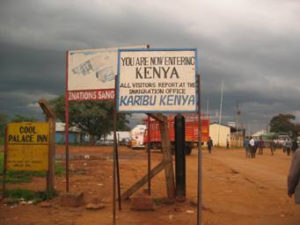
AMUDAT–One cannot think about Kenya’s ethnic tribes; the Kalenjin, the Pokot and the Bukusu without thinking about the districts of Bukwo, Nakapiripiriti (Amudat) and Manafwa in Uganda, Why?
Kenya’s influence on the three Uganda districts at the border is everywhere in these districts, the buildings that they design and build, the lifestyle, currency used let alone the languages spoken.
One clear indication of the connection between these ethnic tribes is the clear pattern of association in the cultures and customs.
Students seeking both upstream and downstream understanding of the interactions between these ethnic groups merely require an analysis of the local trends and patterns of one of the tribes.
If you went to Lwakhakha in Manafwa, Amudat and Suam in Bukwo all border points with Kenya and talked about a colonial boundary between Uganda and Kenya, chances are high that you will be slapped for attempting to divide the people.
Mr. Joseph Weyusya, the Manafwa district senior Community Development officer, says Kenya is home and Uganda is home but regards the issue of boundary as a creation by the colonial masters to merely divide East African people for easy colonisation and administration.
He explains that he has a number of relatives in Kenya whereas he stays in Uganda and that they speak the same language although they are called Kenyans, they circumcise like Ugandans and all have their historical link to Uganda.
“For me Uganda is home and Kenya is home, this other thing called a boundary is imaginary and a colonial calculation to divide us along tribal lines for easy exploitation,” Weyusya says.
In Amudat, the LC5 chairman, Simon Kiyonga, has most of his relatives in Kenya amongst the Pokot.
“And if you visited Amudat [Pokot] there are all signs that you are in Kenya; the language spoken, the dressing of the people, the physical look of the people, the cultures and above all the currency being used,” Kiyonga said.
“Ours is called Pokot nation stretching from as far as Laikipia district near Mt. Kenya to Amudat in Uganda, we use the same currency, we have the same cultures/traditions, same language and way of living” says elder Apanasiya Cheptlak, an elder in Amudat.
Ms Chepleke Yaramwai and Mrs Cheprai Ngolenyang of Akorkeya village, Abiliyebi parish in Loro sub-county in Amudat say it is seasons that define their stay.
“For us once the Kenya side is too hot for us to settle there, we freely cross to Uganda and comfortably stay because it is another home for us,” says Chepleke.
Mr Kiyonga says there are Pokot in Amudat who have never seen Uganda currency and therefore do not know that there is a country called Uganda but that what they know is Kenya.
Asked about their health services Ms Loeseluka Domokwang and Cheptalak said whenever they are sick they go for treatment at Kapenguria in Kenya.
In Bukwo the situation is not any different as Sabiny at Suam because of the bad terrain and road, the nearest town for all their transactions is Kitale in Kenya.
In fact during rainy seasons, this Ugandan district is only accessed through Kenya; this means that in order to go to Ugandan Bukwo one has to go through Kenya, making it more of Kenya district than Uganda
“For us here we know Daily Nation, The standard, The East African and other papers in Kenya streets because Kenya is like home where we buy food, spend leisure, transact all businesses and the only safe route to Uganda,” says former Bukwo district chairman Reuben Chelimo.
Former council member for Bukwo Peter Kamron whose brothers and close relatives live in Kenya consented there is a big problem to define a Kenyan and a Ugandan in Bukwo.
“We live together, farm together in Kenya, transact business from Kenya and have our social evenings in Kenya but cross back to Uganda to just sleep, I mean one does not see Uganda anywhere here maybe when you get a document that has a Ugandan stamp,” he says.
Information gathered from the local leaders indicates that many people have been crossing into Uganda and Kenya freely for business and possess identity cards and voters’ cards for both countries.
Cleophus Ndukwa and Ms Mangadelena Wanjiuku revealed that they do not have a permanent home in Kenya and Uganda but that they keep shifting from one home to another depending on the prevailing circumstances.
Ms Wanjiku says; “We have people who sleep in Kenya, booze in Uganda, do farming in Kenya but transact business in Kenya and that is why we were the happiest when we heard of the East African Community because for us we are ahead.”





